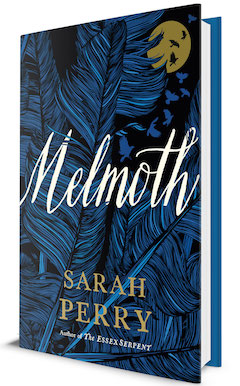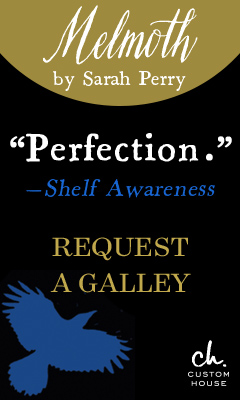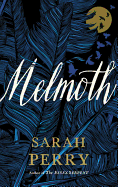Melmoth
by Sarah Perry
Sarah Perry's award-winning second novel, The Essex Serpent, announced her as an irresistible heir to the gothic literature tradition, keeping good company with writers such as Sarah Waters and A.S. Byatt. Now, with the brilliant and engaging Melmoth, she revisits the gothic genre, something the author considers "not a genre, but a sensation," in an arguably truer fashion.
Essex-born Helen Franklin--a saturnine and "drab creature" who works as a translator of the German language and who "[resists] pleasure and companionship as assiduously as a Trappist avoids conversation"--has lived in repentant self-imposed exile in Prague for 20 years. The "pleasures of Bohemia are not for [her]," and with an admirable, if not saddening, commitment to a kind of self-flagellating lifestyle she "willingly serves her full life term, having been her own jury and judge." Helen's history, the origins of her burden of guilt and why she has chosen self-denial remain unknown for the majority of the story.
In keeping with her atonement, Helen rents a room in the heavily decorated flat of one Albína Horáková, an "old, malicious, unkind" woman "devoted to sentimental opera and Turkish Delight," with whom she has a deceptively antagonistic relationship. But despite her generally sequestered life in "the mother of cities and... her thousand spires," Helen has allowed herself two friends: Karel Pražan, a Czech doctor associated with the university, and his English wife, Thea, a retired barrister. Warm in their reception of Helen, they frequently host dinners for their "odd friend," attempting to ply her with wine and food, which she always rejects or takes in scarce amounts.
However, Thea has suffered a stroke, and "they are gone now, those easy evenings." Furthermore, Helen has just been chased down by an uncharacteristically "stooping, uneasy... frantic Karel" who's holding an old leather file that is filled with stained documents. It's monogrammed with the letters J.A.H., and he grips it "with both avarice and distaste." Helen worries that Karel and these files that he insists on sharing with her, these things with supposedly "such malignant power," threaten to upset her exacting and calm mind that is "buttressed on all sides against disruption, against emotion." Paranoid and shaken, he's surely being followed by a woman and asks Helen, "Tell me: do you know the name Melmoth?"
The documents that Karel urges Helen to read are the compiled research of the haunted Josef Aldelmar Hoffman, a 94-year-old German who grew up in Nazi-occupied Czechoslovakia. Josef's files include a short entry from Anna, a young woman in Cairo in 1931. She has recorded the testimony of Isimsiz, a beggar from Turkey whose father had forewarned him about "the pride of nations." Another submission is from a 17th-century Englishman who writes to his wife about Alice Benet, an old Protestant woman who recalls her younger years under "Bloody Mary" Tudor's reign, and her encounter with a divine-smelling woman "clad in some thin black stuff." All the stories contained in Hoffman's collection come from those who did "what [they] ought not to have done."
Reworking the eponymous character from Charles Maturin's lesser-known 1820 gothic masterpiece Melmoth the Wanderer, Perry's monstrous specter is a woman cursed since the time of Jesus "to walk from Jerusalem to Constantinople, from Ireland to Kazakhstan... excommunicated from the grace of God" and charged with bearing witness to "guilt and transgression." While some of the sins in Melmoth are revealed and certainly worthy of righteous penalty, others go undisclosed or are of a more precarious immoral nature. But Melmoth is a deeply hungry figure, conjured by the thinnest sliver of contrition.
Perry wields equivocation with skillful finesse. Such ambiguity, along with character mirroring and the coupling of opposing sensations (abstinence and indulgence, desire and fear, foreign and familiar) are the strange and beautiful connective tissues shoring up Melmoth. She pits reason against extreme emotions, resulting in uncertainty, then abandons readers to their own judgmental devices. The end result is an almost uncanny shared experience between Perry's audience and her characters.
Melmoth is a genius synthesis of multiple classic gothic elements. Perry's characterizations of both people and places are ample and true to form (some of the best scenes occur in an opera house and a library), yet never cloying or bogged down in elucidation. In pulling these elements through time and adjusting them to the contemporary moment--while masterfully maintaining a certain timelessness--Perry picks apart the intimate costs of personal moral failures and collective atrocities. And, as with each confession in Melmoth, the revelation of Helen's crime and its consequences has a transformative effect on the confessor. Here, it is not only another heartbreaking reminder of the futility of looking away, for "only children think closing your eyes makes a thing go away," but also a reminder of the beauty in hope. --Shannon Hanks-Mackey








